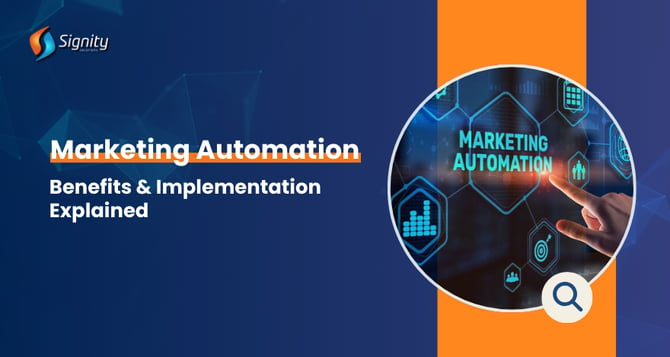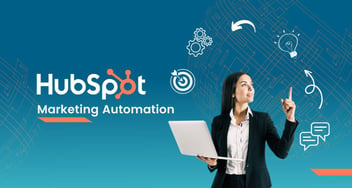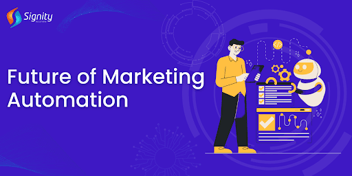How Marketing Automation Benefits You And How To Implement It
Discover how marketing automation is transforming firms by offering benefits like enhanced efficiency, personalized user experiences, scalability, and increased ROI. This blog also discusses the industry's best practices, such as personalization, lead nurturing, and multi-channel campaigns.

- Nowadays, marketing automation is the buzzword in many industries due to its transformative powers and efficiency.
- In a firm, marketing automation offers key benefits like personalized customer experiences, scalability, and improved ROI.
- The process of implementing ROI is simple and consists of steps like identifying your KPIs and creating engaging content for users.
- There are some best practices for marketing automation, such as personalization, multi-channel campaigns, and lead scoring.
In today’s competitive market, customers stick to businesses that provide personalized experiences. With several buyers across various countries, it can be difficult to handle it all manually.
What’s the perfect solution? Whether your goal is to engage with more customers at a time or save money and time, marketing automation is the answer.
With the right marketing automation services and tools, entrepreneurs can enhance efficiency, increase conversions, build personalized marketing campaigns, and align marketing and sales efforts for better results.
This blog is your complete guide to marketing automation benefits and how to implement marketing automation in your business for better growth.
Before you explore the advantages, here are some numbers to prove why businesses should adopt best practices for marketing automation.
Key Marketing Automation Stats
Let’s take a closer look at the marketing automation stats and understand how it can help businesses across all industries:
- Marketing automation tools can be used for various purposes in the business, such as email marketing, paid ads, and more, helping save plenty of time and effort.

- Implementing marketing automation workflows helps improve customer experience by up to 43% and decision-making by up to 35%.
- From research and development to customer services and admin operations, marketing automation helps companies in several ways.
The numbers above prove the demand for marketing automation and that companies can benefit from it in multiple ways. Let’s look at the advantages one by one.
Advantages of Marketing Automation
In an increasingly competitive landscape, businesses must leverage every available tool to stay ahead. Marketing automation offers a powerful solution to streamline processes and maximize efficiency.

Let’s deep dive into the key benefits that marketing automation offers firms-
1. Enhanced Efficiency
Marketing automation for firms facilitates omnichannel collaboration. It allows the firm to manage campaigns across various channels and automate routine and mundane tasks. This allows the marketing and sales teams to focus on the firm’s roadmap and move forward. This precision in marketing initiatives increases customer engagement and enhances conversion rates.
Other than this, marketing automation offers a very data-driven approach. With comprehensive reporting and analyzing capabilities, it provides actionable insights to firms about customer behavior and patterns.
According to a report by Ascend2, Email (63%), social media management (50%), and paid ads (40%) are the most reported areas where marketing automation is currently used.
2. Sales and Marketing alignment
This is one of the most overlooked marketing automation trends. Marketing automation helps in sales and marketing alignment in the following ways-
- Marketing automation consolidates data from various sources and presents it under one umbrella platform. This helps firms segment markets and better target campaigns.
- The lead-scoring mechanisms provided by marketing automation are very advanced, helping to target qualified leads.
- Marketing automation allows instant notifications and updates to be sent to the sales and marketing teams. For example, if a prospective customer fills out a form or downloads an Epaper, the team is notified instantly.
- Automation platforms offer robust analytics and reporting features that provide insights into the effectiveness of marketing campaigns and sales efforts.
3. Personalized Customer Experiences
This is one of the best marketing automation benefits. Marketing automation leverages data and insights and helps create tailored solutions for customers. The customer segmentation process is automated based on their behavior, the time they spend on the company site, demographics, and patterns.
Using these insights, companies can easily meet their customers' ultimate needs. Hence, customer loyalty is elevated, and customers find it easy to trust the brand. Marketing automation can also monitor user interaction and suggest tweaks in strategies in real-time.
4. Improved Lead Management
Marketing automation helps streamline the entire process from lead generation to user conversion. Pre-set criteria include user behavior, demographics, and the level of engagement with the site or the product.
Automated lead nurturing helps deliver targeted content to customers. Firms can also attend to customer queries in appropriate time frames, which helps with branding and messaging.
5. Data-Driven Insights
The data-driven insights that marketing automation provides firms help streamline their efforts. Using these data, companies can analyze customer behavior very effectively. This aids in more timely interactions with customers.
This feature also ensures brand consistency across various channels. By leveraging effective data insights, industries also ensure that marketing processes comply with compliance standards.
6. Consistent Messaging Across Channels
- Marketing automation provides a platform for storing all marketing content, such as texts, images, audio, graphs, and other forms of media. This helps consolidate the data into one single repository.
- Marketing automation tools allow for creating and managing multi-channel campaigns from a single platform. These can include SMS, social media calendars, digital marketing literature, and other content.
- Pre-built templates for various marketing campaigns are present, such as notifications, promotional emails, follow-up emails, welcome emails, etc.
- Marketing automation uses customer data to personalize messages based on individual preferences, behaviors, and demographics while maintaining a consistent core message.
7. Scalability
The ways in which marketing automation helps upscale marketing campaigns are as follows-
- By customizing the messages, marketing automation helps create compelling content tailored to a particular audience. The content delivered to each individual is particular and relevant, and naturally, the conversion rates are higher.
You can use various copywriting prompts to get content that is engaging and likely to convert your leads. - Marketing automation helps nurture leads through pre-set workflows. This allows the marketers to handle a large volume of tasks and ensure that the customers receive the right message.
- Marketing automation platforms integrate various channels such as email, social media, and web marketing. This unified approach allows for consistent and coordinated campaigns across multiple platforms.
- Automated tools provide real-time analytics and generate comprehensive reports. This feature enables marketers to assess the success of a campaign and make more informed decisions.
8) Cross-channel integration
Marketing automation facilitates cross-channel integration in the case of marketing campaigns by standardizing marketing efforts across multiple platforms. This ensures a consistent and unified customer experience.
Automated tools like Marketo and HubSpot can manage and synchronize campaigns across emails, social media, SMS, websites, and more, allowing marketers to deliver cohesive messaging and branding regardless of the channel. This gives the firm a very comprehensive view of the customer’s journey.
9) Improved ROI
Since marketing automation helps firms reach targeted customers more, costs are reduced. Optimizing marketing spend through targeted campaigns and efficient resource utilization improves ROI.
Marketing automation increases operational speed and productivity by automating repetitive tasks and workflows. Attending customer service requests in real-time increases conversion rates. Utilizing SMS for customer service can further streamline real-time responses, enhancing customer satisfaction and improving conversion rates through quick and effective communication. Data-driven insights enable continuous optimization, ensuring that marketing efforts are aligned with business goals. Overall, this leads to an enormous increase in ROI.
How to Implement Marketing Automation
1. Set Clear Goals and Objectives
This step includes identifying the key Performance Indicators (KPIs) and defining the targeted success rates. One must ensure that the targets and the marketing roadmap align with each other. Some minor milestones should also be defined. This helps with workforce planning and engagement.
Technology:
- Google Analytics
- Some goal-tracking systems like Hubspot/Marketo or MailChimp
2.) Choose the Right Automation Tools
Different teams in a firm have different requirements, and the first step in this phase is to identify the specific needs of each department. Different marketing tools should be analyzed, and the decision should be made based on factors like convenience, pricing, and target audience. Before zeroing down on any tool, the firm must go for demos, live videos, and tutorials to get a better understanding.
3.) Segment Your Audience
In this step, the audience is divided into categories based on factors like user patterns and behavior, spending habits, and demographics. This helps firms channel their marketing campaigns and target the right audience. It also ensures that the message reaches the right audience in due time.
Technology:
Marketing automation integration with CRM tools(Customer Relationship Management) will help collect and analyze customer data such as website engagement, bounce rates, and email openings.
4.) Create Compelling Content
Once the customer base has been segmented, it is important to create engaging content for each group. The content team must conduct extensive research and brainstorming during this phase.
This phase optimizes content, streamlines the production pipeline, and ensures that the content is delivered on time.
5.) Implement Automation Workflows
In this phase, repetitive and mundane tasks are automated to improve efficiency and consistency. This reduces the marketing and content teams' manual efforts and saves a lot of time. Also, since the entire process is automated, errors are minimized.
Technology:
Email automation, customer onboarding, and follow-ups.
6.) Monitor and Analyze Results
This step is crucial for analyzing and monitoring the effectiveness of a marketing campaign. Optimizing and tweaking campaigns in real time is also crucial for firms.
Having reliable service scheduling software can greatly enhance your business's operational efficiency. This type of software helps you track and manage field operations seamlessly, ensuring that assigned tasks and dispatching become as smooth as possible.
By integrating advanced automation features into your own field services management systems, significantly greater customer satisfaction and work order compliance can be achieved.
Changes in customer behavior are very dynamic, and understanding customer preferences is very important to skyrocketing sales.
Technology:
Analytics tools integrated with marketing automation platforms provide real-time data on campaign metrics (e.g., open rates, click-through rates, conversions) and customer behavior.
Now that we have understood the various steps to implement marketing automation at your firm let's examine some of the best practices as well.
Marketing Automation Best Practices
a) Personalization
This is one of the best practices in marketing automation. It involves leveraging personalization and implementing segmentation of the targeted customers. Marketing automation gathers customer data, such as engagement activities and preferences, demographics, and so on. By using customer data to create targeted segments, marketers can create tailored and personalized messages to prospective clients.
Automated systems, such as Sentry and Zipy.ai, offer a cutting-edge user session replay tool that provides detailed insights into how users interact with your site. By utilizing user session recording, businesses can observe real-time user behavior and understand engagement patterns. The potential of session replay tools helps to revolutionize your marketing approach and enhance user experience.
This personalization tactic increases relevance and engagement, leading to higher conversion rates. Customers can build trust in the brand, which fosters brand loyalty.
b) Lead Nurturing
In order for any marketing campaign to flourish, it is very important to implement a very robust lead nurture mechanism. Implementing lead scoring and nurturing is essential for maximizing the efficiency of marketing automation. Lead scoring assigns values to prospects based on their interactions with your brand, helping prioritize leads that are more likely to convert.
Automated marketing tools can provide consistent messaging to customers throughout the sales funnel. This ensures customer retention and increases brand loyalty and authenticity.
c) Multi-Channel Campaigns
If a firm wants to run an omnichannel campaign, it should first ensure that there is seamless data exchange across all channels. Automation tools can coordinate efforts across email, social media, SMS, and more, providing a seamless and consistent messaging experience to prospective customers.
By automating these processes, marketers can maintain a strong presence on multiple platforms without overwhelming their resources. They can even view their entire customer journey and make more informed decisions. Firms can also monitor the analytics and reach out to customers when they are most active on social media.
d) Analytics and Reporting
Utilizing analytics and continuous optimization is crucial for the success of marketing automation. Automated tools provide detailed insights into campaign performance, allowing marketers to track metrics such as open rates, click-through rates, and conversions.
Regular analysis of this data helps identify what’s working and what’s not, enabling marketers to make informed adjustments to their strategies. This ongoing optimization ensures that campaigns remain effective and continue to deliver the best possible results.
Why Should You Choose Signity Solutions?
Signity Solutions is a pioneer in marketing automation, empowering businesses to unlock their full potential and achieve exponential growth. Our team of over 20 automation experts, coupled with the best automation platforms, ensures that your marketing operations reap full benefits.
By leveraging our comprehensive suite of services, you can expect higher accuracy, increased lead generation, and improved ROI. We offer -
- Expert Consultation: Our marketing automation consultants analyze your existing processes to recommend the most suitable use cases and platforms.
- Rigorous Audits: We perform detailed audits of your current automation software to maximize its potential and ensure you implement the best strategies for optimal performance.
- Seamless Management: Our expertise in integrating and managing leading marketing automation platforms guarantees that your systems are always optimized.
- Effective Campaign Management: We build and manage complex multi-channel automation workflows, crafting an optimized customer journey.
- Innovative UX Design: Our services include developing engaging and interactive UX designs that are integrated seamlessly with your automation systems.
- Strategic Drip Email Marketing: We design and execute comprehensive drip email campaigns to nurture leads and drive remarketing efforts effectively.
- Custom Solutions: We offer personalized development and integration services to tailor marketing automation solutions to your specific business needs.
We partner with leading marketing automation platforms, such as Salesforce and Marketo, to deliver top-tier services that revolutionize your marketing efforts.
















